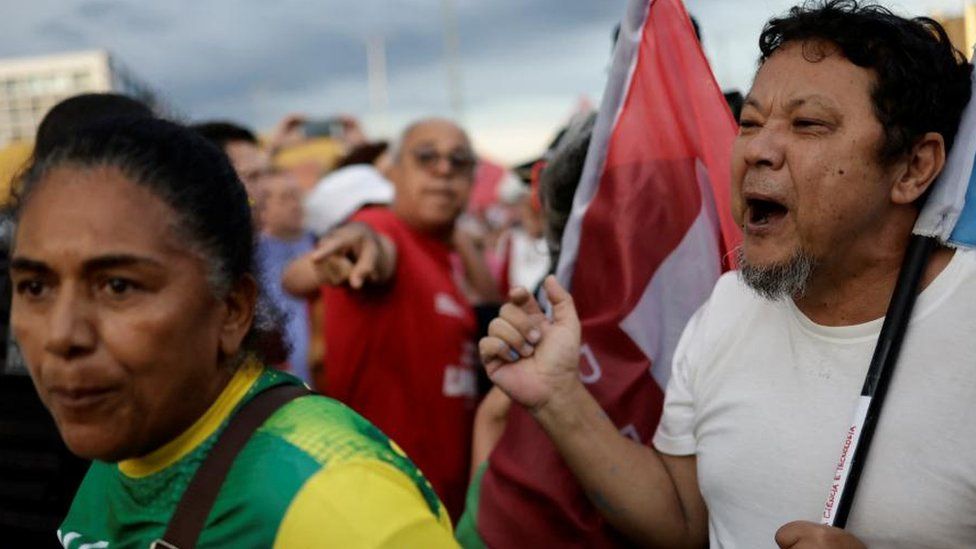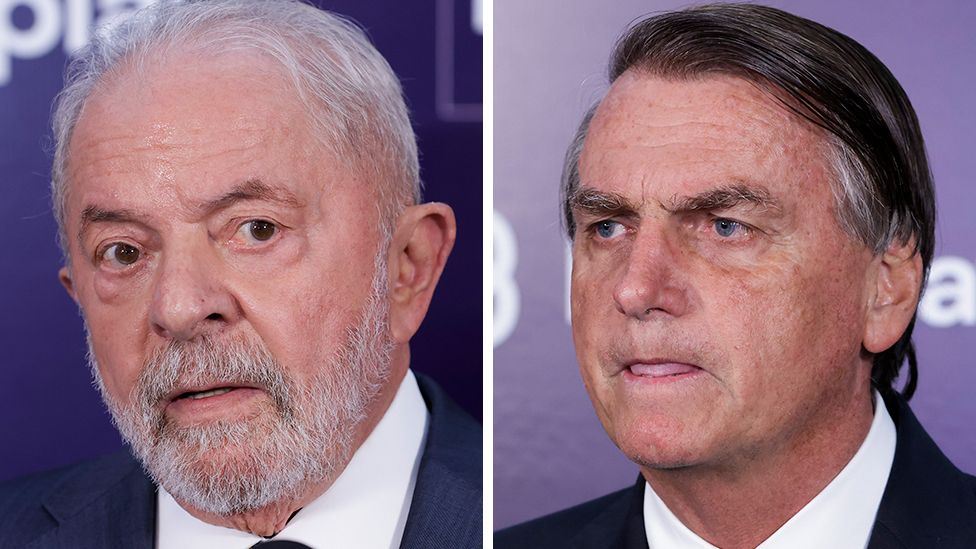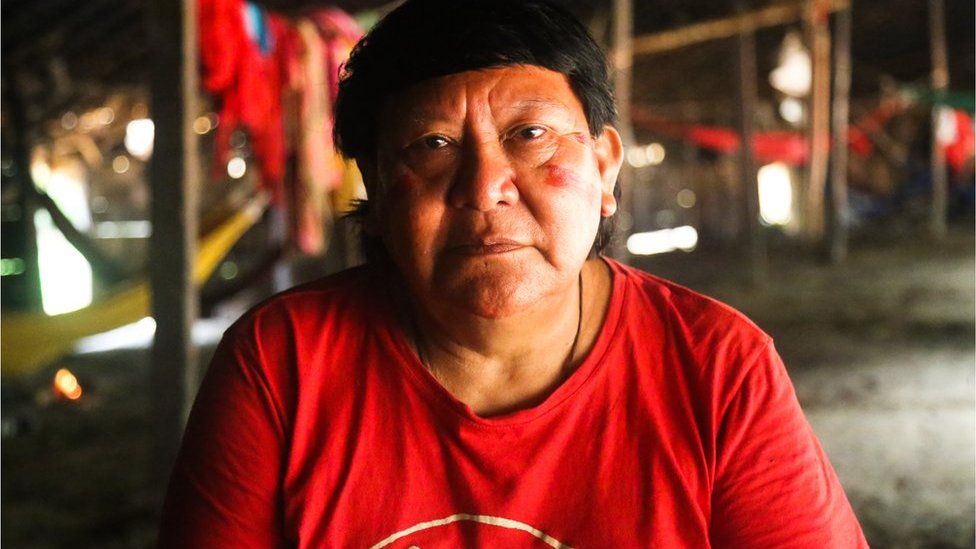Message of the Day: Human Rights, Environment, Economic Opportunity, Hunger, Disease, Population



“Brazil Elects Lula”, “Lula Makes Stunning Comeback”,”The New York Times, BBC News, 30.10.22
In the struggles for democracy, human rights, equality and the environmental survival of the planet, no more important marker of hope for progress has happened than the victory in the presidential election in Brazil today of Luiz Inácio Lula da Silva, or “Lula’ as he is known.
For the first time since the end of the military dictatorship and the democratic system put in place 34 years ago, a first-term president, Jair Bolsonaro, has been defeated.
Bolsonaro expressed support for the dictatorship and undermined democracy while in office.
Lula was the most revered president in Brazil in modern history–perhaps in all Latin America in modern history, from 2002 to 2010.
Barack Obama called him the most popular politician on the planet.
After leaving office because of term limits, and after his successor in his party stayed in power another eight years, he would easily have been voted back to the presidency in 2018 if he had not been restricted from running by a corruption case which the Suprme Court subsequently threw out.
Lula brought more people out of poverty than anyone in Brazilian history, reducing inequality enormously, including protecting indigenous rights.
Bolsonaro oversaw huge increases in poverty, hunger, threats to indigenous peoples and the second largest national death rate in the world after the US from Covid under his anti-vaccination policies.
Lula reduced deforestation in the Amazon more than anyone in Brazilian history.
Bolsonaro increased it more than anyone in Brazilian history.
We laid out the history and stakes of what was about to occur in this situation in The End Of Civilization As We Knew It, Part Ten, four years ago.
As noted then, the economic boom from oil was not sustainable and without guarantees of basic economic security and human rights for everyone on the planet, nothing will be sustainable. There are many more challenges facing Lula this time around, including a closer vote (though he won by over 2 million votes) and polarization fed by Bolsonaro. But the basic principles of democracy, equality and environmental sustainability have been reinforced at a critical moment.
We post below the front page article and related articles from the New York Times online tonight and in print tomorrow.
We also post the front page online article from the BBC News today and related articles, particularly an article on the critical issues related to the Amazon, the lungs of the world as they have been called, and the central impact on climate change.
. . .
“Brazil Elects Lula, a Leftist Former Leader, in a Rebuke of Bolsonaro”, by Jack Nicas, with Flávia Milhorance and Ana Ionova contributed reporting from Rio de Janeiro, André Spigariol from Brasília and Laís Martins from São Paulo.
América Latina observa con atención las elecciones en la democracia más poblada de la región. The New York Times ofrece su cobertura también en español.

BRASÍLIA — Voters in Brazil on Sunday ousted President Jair Bolsonaro after just one term and elected the leftist former President Luiz Inácio Lula da Silva to replace him, election officials said, a rebuke to Mr. Bolsonaro’s far-right movement and his divisive four years in office.
The victory completes a stunning political revival for Mr. da Silva — from the presidency to prison and back — that had once seemed unthinkable.
It also ends Mr. Bolsonaro’s turbulent time as the region’s most powerful leader. For years, he attracted global attention for policies that accelerated the destruction of the Amazon rainforest andexacerbated the pandemic, which left nearly 700,000 dead in Brazil, while also becoming a major international figure of the far right for his brash attacks on the left, the media and Brazil’s democratic institutions.
More recently, his efforts to undermine Brazil’s election systemdrew particular concern at home and abroad, as well as worldwide attention to Sunday’s vote as an important test for one of the world’s largest democracies.
Without evidence, the president has criticized the nation’s electronic voting machines as rife with fraud and suggested he might not accept a loss, much like former President Donald J. Trump. Many of his supporters vowed to take to the streets at his command.
The results on Sunday made clear that tens of millions of Brazilians had grown tired of his polarizing style and the frequent turmoil of his administration. It was the first time an incumbent president failed to win re-election in the 34 years of Brazil’s modern democracy.
Still, Mr. da Silva won with the narrowest margin of victory over that same period, signaling the deep divide that he will confront as president.
He won 50.90 percent of the votes, versus Mr. Bolsonaro’s 49.10 percent with 99.98 percent of the vote counted Sunday night.
“I will govern for 215 million Brazilians, and not just for those who voted for me,” Mr. da Silva said in his victory speech Sunday night, reading from pages held by his new wife, whom he married this year. “There are not two Brazils. We are one country, one people, one great nation.”
Mr. da Silva, 77, a former metalworker and union leader with a fifth-grade education, led Brazil during its boom in the first decade of the century, but he was later convicted on corruption charges after he left office and spent 580 days in prison.
Last year, the Supreme Court threw out those convictions, ruling that the judge in his cases was biased, and voters rallied behind the man known simply as “Lula.”
Mr. da Silva’s election brings an end to a presidential race that was widely regarded as one of the most important votes in Latin America in decades, a match between perhaps Brazil’s two biggest living political figures, with starkly different visions to reverse the country’s fortunes.
His victory also pushes Brazil back to the left, extending a string of leftist victories across Latin America, fueled by a wave of anti-incumbent backlash. Six of the region’s seven largest countries have now elected leftist leaders since 2018.
Despite his victory, a sizable portion of Brazil’s 217 million people still view Mr. da Silva as corrupt because of the vast government kickback scheme uncovered years after he left office. And while his corruption convictions were nullified, Mr. da Silva was never ruled innocent.
Yet, amid those flaws, the strong opposition to Mr. Bolsonaro and his far-right movement was enough to carry Mr. da Silva back to the presidency.
“He’s not the solution to every problem. But he’s our only hope,” said Stefane Silva de Jesus, a 30-year-old librarian, after she cast her ballot for Mr. da Silva in Rio de Janeiro.
He is set to take office on Jan. 1.
The election of Luiz Inácio Lula da Silva is a drastic shift back to the left for Brazil after four years of President Jair Bolsonaro’s far-right administration.
While the former leftist leader has vowed to “reestablish harmony” in the country, his specific plans, have been vague. Mr. da Silva’s stump speech revolved around expanding services for the poor, including more social welfare payments, a higher minimum wage and programs to feed and house more people. To pay for it, he said he would raise taxes on the rich but also simply increase government spending.
How much he will be able to implement is unclear. Mr. Bolsonaro’s right-wing party holds the most seats in Congress and a powerful centrist bloc controls both the House and Senate; the country faces worse economic conditions than during Mr. da Silva’s first administration; and the interventionist policies of Mr. da Silva’s handpicked successor as president led Brazil into a recession in 2014 from which it has still not fully recovered.
His election, however, will likely be good news for the health of the Amazon rainforest, which is vital to the fight against climate change. Mr. Bolsonaro championed industries that extract the forest’s resources while slashing funds and staffing for the agencies tasked with protecting it. As a result, deforestation soared during his administration.

Mr. da Silva has a much better track record on protecting the forest, reducing deforestation while president. He campaigned on a promise to eradicate illegal mining and logging and said he would push farmers to use areas of the forest that had already been cleared.
Mr. da Silva’s victory was in part thanks to a broad coalition, from communists to centrists, as the Brazilian electorate sought stability after Mr. Bolsonaro’s volatile term, which was marked by clashes with the courts, a pandemic that killed more people than anywhere but the United States, and frequent attacks on the left, the media, academics, health professionals and the nation’s democratic institutions.
Mr. Bolsonaro, 67, has faced a variety of investigations in the Supreme Court and Congress, including for his statements attacking the election system, his handling of the pandemic and his potential involvement in disinformation operations.
So far, he has avoided any consequences from those probes, in part because of his immunity as president. After he leaves office on Jan. 1, those investigations could gain steam.
Mr. Bolsonaro has also had much of his activity as president shielded from government-transparency laws because his administration effectively classified many records for up to 100 years, including his vaccine status.
Mr. da Silva has vowed to declassify those records once president. “When we lift the carpet, you’re going to see the rot underneath,” he said at Friday’s debate.
André Spigariol contributed reporting.
While the election is over, there remains the concern for the health of one of the world’s biggest democracies. President Jair Bolsonaro has spent years attacking Brazil’s democratic institutions, including a sustained effort to undermine its voting system, leading millions of Brazilians to lose faith in the integrity of their nation’s elections.
Now, much of the country is wondering: Will he accept his defeat?
Sunday’s vote split this country of 217 million people nearly down the middle, with many voters on each side viewing the choice as an existential one for the nation.
Yet in the aftermath of the vote that ousted Mr. Bolsonaro after just one term, there was little immediate sign that the president’s allies and supporters would mount an effort to dispute the results.
Far-right lawmakers who had warned of fraud in the past immediately recognized Mr. da Silva as the president-elect. Prominent conservative pundits called Mr. da Silva an ex-convict and corrupt, but did not claim the election was rigged. And many of Mr. Bolsonaro’s supporters on the streets of Rio de Janeiro, while shouting about fraud in general, cleared out of a gathering outside the president’s condo in Rio de Janeiro to return to their homes dejected.
As of 9 p.m. local time, Mr. Bolsonaro had yet to concede or publicly address the country.
The close race, high stakes and deep polarization led to an ugly election campaign. Misinformation has soared in recent weeks, with supporters of Mr. da Silva accusing Mr. Bolsonaro of being a cannibal and a pedophile, while Mr. Bolsonaro’s supporters have called Mr. da Silva a gang leader, a communist and a Satanist who wants to close the nation’s churches.
Election officials tried to intervene, ordering posts and videos off the internet that they said were false. Those efforts slowed the deluge of misleading information, but they also became their own controversy, drawing a swell of complaints of unfair refereeing, particularly from Mr. Bolsonaro and his allies.
Last year, Mr. Bolsonaro told his supporters there were only three outcomes to the election: He wins, he is killed or he is arrested. He then added, “Tell the bastards I’ll never be arrested.”
That sort of rhetoric raised alarms that Mr. Bolsonaro would not accept the results. He was one of the last world leaders to recognize President Biden’s victory in 2020, repeating former President Donald J. Trump’s false claims that the election was stolen, including just two days before his first meeting with Mr. Biden earlier this year.
There is no credible evidence of fraud in Brazil’s electronic voting machines since they were introduced in 1996. Yet Mr. Bolsonaro has questioned the system for years.
Earlier this year, his criticism of the system took on new gravity when Brazil’s military joined in. Leaders of the armed forces pushed election officials for changes to the system, rattling a country that suffered under a military dictatorship from 1964 to 1985.
But eventually military and election officials agreed to a change to some tests of the voting machines on Election Day, and military leaders have since suggested they are satisfied with the system’s security.
In recent weeks, military leaders also said privately that they would not support any efforts by Mr. Bolsonaro to challenge the results.
On Friday, in an interview after the final debate, Mr. Bolsonaro was asked directly whether he would accept the vote’s results, regardless of outcome.
“There’s no doubt,” he said. “Whoever gets more votes, takes it. That’s democracy.”
— Jack Nicas and Flávia Milhorance

The former shoe shine boy who rose to the presidency left office a little more than a decade ago with rock star popularity, the embodiment of a nation that appeared to be on the cusp of greatness.
The downfall of that president, Luiz Inácio Lula da Silva, and of his country, Brazil, was just as dramatic. A corruption scandal landed him in prison and exposed the malfeasance and miscalculations that helped bring an era of prosperity to a screeching halt, dragging down Latin America’s largest economy and setting in motion a period of political turbulence.
Mr. da Silva has never fully acknowledged the role of his Workers’ Party in the government corruption scheme that persisted for much of the 13 years it was in power. The investigation, called Operation Carwash, revealed how companies paid hundreds of millions of dollars in bribes to government officials in exchange for public contracts.
Mr. da Silva says that political enemies framed him to eliminate the Workers’ Party from Brazilian politics. He has also accused the U.S. government of helping to drive the investigation.
The Carwash investigation was eventually engulfed in its own scandal, as it became clear that it had been used as a political tool. Prosecutors focused on the crimes of the Workers’ Party over other parties, and investigators leaked Mr. da Silva’s taped conversations. Sergio Moro, the federal judge overseeing the case, was later revealed to be colluding with prosecutors, while also acting as the sole arbiter in many of the trials.
Mr. da Silva was convicted twice — in 2017 and 2019 — of accepting a condo and renovations from a construction company bidding on government contracts. He was sentenced to a total of 22 years in prison.
After 580 days behind bars, he was released in November 2019 after the Supreme Court ruled he could be set free while pursuing appeals.
Then, in 2021, the Supreme Court threw out his convictions, ruling that they were tried in the wrong court and that Mr. Moro was biased.
Now, Mr. da Silva has become Brazil’s president once again, in an incredible political resurrection that at one time seemed unthinkable.
— Ernesto Londoño, Jack Nicas and Flávia Milhorance
Jair Bolsonaro won Brazil’s last presidential election pledging to clean up politics, and since taking office in 2019, he had said at least 237 times that his government had “zero corruption.”
Those assertions resonated with supporters of Mr. Bolsonaro as he faced a tight runoff on Sunday for the presidency against the once-imprisoned former President Luiz Inácio Lula da Silva.
In recent weeks, however, Mr. Bolsonaro worried about the prospect of prison himself, according to two senior officials who heard those concerns from the president and spoke anonymously to describe private conversations.
Despite his assertions, Mr. Bolsonaro and his inner circle have faced investigations on accusations including the embezzlement of public funds, theft of staff wages and mishandling of the Covid-19 pandemic. The inquiries had been staved off or blocked so far, given his political influence and presidential immunity.
But that may change now that Mr. Bolsonaro lost Sunday’s presidential election.
“After leaving office, there is no immunity, none, for crimes committed by a former president in Brazil,” said Eloísa Machado, a law professor at Fundação Getulio Vargas, a university and research organization in São Paulo, Brazil.
Brazilian law leaves less room for interpretation on the issue than in the United States, where former President Donald J. Trump’s assertions of presidential immunity have helped him maneuver around investigations and lawsuits.
In Brazil, only the attorney general can investigate an acting president, and only the Supreme Court can prosecute one, which “definitely helps prevent investigations,” according to Davi Tangerino, a law professor at the State University of Rio de Janeiro.
In 2019, Mr. Bolsonaro appointed Augusto Aras as attorney general, ignoring a two-decade tradition of federal prosecutors’ choosing their chief. Since then, the attorney general’s office has shelved more than 100 inquiry requests, most related to Mr. Bolsonaro’s chaotic and possibly corrupt response to the pandemicand his attacks on the Supreme Court.
“The attorney general gave him a shield from any liability,” Ms. Machado said.
In addition, Mr. Bolsonaro and two of his sons have been implicated in allegations that they took portions of staff members’ wages during their terms as congressmen. Last year, the attorney general’s office opened inquiries into the president’s cases, but there has been no movement on them.
A couple of months ago, the family finances were thrown into the spotlight with reporting by the news site UOL indicating that half the family’s 107 real estate purchases had been bought with cash. Prosecutors in Rio de Janeiro are examining whether 25 of those were purchased with money siphoned from staff wages.
The president had also managed to keep a tight hold on Congress, which has deferred more than 130 impeachment requests. The Brazilian news outlets Estadão and Piauí reported that, in exchange, his administration had allowed a handful of members of Congress to grant more than $8 billion for their regional electoral bases. A couple of weeks ago, the federal police arrested two people linked to this alleged embezzlement scheme, dubbed “the secret budget.”
To shield himself and his circle from scrutiny, Mr. Bolsonaro had also extended protections against dozens of requests for information, imposing 100-year secrecy classifications on data like the names of people who visited the presidential palace and communications from the Ministry of Foreign Affairs.
Mr. da Silva, who went to prison for corruption, has used the issue in his campaign, vowing, “On my first day of government, I will lift these secrecies.”
André Spigariol contributed reporting.
— Flávia Milhorance
RIO DE JANEIRO — Brazil’s elections chief ordered the head of the country’s highway police to answer allegations that he had ordered traffic stops, particularly of buses transporting voters to the polls, in an effort to suppress turnout in Sunday’s presidential election.
There were dozens of reports on social media on Sunday that federal highway agents were stopping vehicles and questioning people in several states across Brazil. Such stops appeared to violate orders from election officials on Saturday to halt any traffic stops on Election Day that could hinder people’s efforts to vote.
Alexandre de Moraes, a Supreme Court justice who leads Brazil’s election agency, issued an order to the head of Brazil’s federal highway police, calling on the official to provide proof that his officers were not violating election rules to benefit President Jair Bolsonaro, the far-right incumbent.
In the order, Mr. Moraes included a link to a tweet from a person claiming that the highway police had set up a roadblock in the northeastern city of Cuité and were not letting people pass. “It’s already driving away the population of the countryside!” the tweet said. Brazil’s northeast is a leftist stronghold.
On Sunday afternoon, Mr. Moraes told reporters that election officials’ initial investigation found that the stops delayed the buses, but they all still reached their intended polling stations. “We didn’t have any voters who didn’t vote because of the operations,” he said.
Silvinei Vasques, the highway police chief, responded to Mr. Moraes’s order to halt Election Day traffic stops, saying that the highway police would not target public buses. But, he added, the police would continue to conduct stops because, he said, Mr. Moraes’s order did not apply to all federal highway operations.
As of Sunday afternoon, the federal highway police had stopped more than 550 buses across the country, according to a federal highway officer with access to internal data who spoke on condition of anonymity. On Sunday, Oct. 2, in the first round of voting, the highway police stopped nearly 300 buses, according to the officer.
A post on Mr. Vasques’s official Instagram account on Saturday urged people to vote for Mr. Bolsonaro, according to O Globo, one of Brazil’s biggest newspapers. The kind of message he posted automatically disappears from Instagram after 24 hours and was no longer visible on Sunday. Mr. Vazques had previously posted various photos with Mr. Bolsonaro.
Thomas Thaler, 45, a computer programmer, said his wife gave up on voting after her bus got stuck in traffic and then was stopped by highway police on the way to vote in Recife, a large city on Brazil’s northeastern coast. She eventually exited the bus and took a different bus back home. She said she had planned to vote for Mr. da Silva.
Jessica Sousa, 22, a student, said she was stuck in traffic near Cuité in Brazil’s northeast and then eventually questioned by the highway police, who requested her I.D. and asked about her plans. She eventually managed to get to a polling station and vote for Mr. da Silva.
— Ana Ionova, André Spigariol, Laís Martins and Jack Nicas
As leftist leaders have swept into office across Latin America in recent years, Brazil’s diplomatic relations with the region have cooled under the right-wing incumbent, Jair Bolsonaro, who had bashed many of his new peers.
Luiz Inácio Lula da Silva has promised to restore stronger relations with the country’s neighbors.
Mr. Bolsonaro blamed Argentina’s left-wing government for mismanaging that country’s economy, hurled insults at Chile’s new leftist president and urged voters to reject Mr. da Silva in order to stop Brazil from “turning into Venezuela.”
Brazil’s president “has used Latin America as a symbol of a leftist backslide,” said Esther Solano, an international relations professor at the Federal University of São Paulo. “Latin American communism is this common enemy, this boogeyman.”
Mr. Bolsonaro’s criticism so badly strained relations between Brazil, Latin America’s biggest country, and its neighbors that many regional leaders were rooting for Mr. da Silva, known universally as Lula, according to two South American diplomats who spoke on the condition of anonymity to talk about the private discussions in their governments.
After Mr. da Silva emerged as the top vote-getter in the election’s first round on Oct. 2, President Alberto Fernández of Argentina wrote on Twitter: “I congratulate my dear Lula for his victory.”
During his two terms in office, from 2003 through 2010, Mr. da Silva pushed to deepen regional alliances, most notably through Mercosur, South America’s main political and trading bloc. The former unionist even proposed a single currency for the region, though the idea — deemed unviable by most experts — never got off the ground. Still, he has raised the idea again in his current campaign.
“He will do whatever it takes to reposition Brazil — like he did in the early 2000s — as a leader in South America,” said Guilherme Casarões, a political scientist at the Getúlio Vargas Foundation, a Brazil-based research institute.
Hussein Kalout, an international relations researcher at Harvard University who has participated in some of Mr. da Silva’s recent meetings with foreign officials, said that Mr. da Silva wants to increase cooperation with other Latin American countries around climate change.
“Brazil is totally adrift and isolated in its own region, and this is not good,” he said.
Mr. Bolsonaro, elected in 2018 on promises to place “Brazil above everything,” took a more isolationist approach, reducing regional trade and quitting regional bodies.
Sunday’s election could also prove a crucial bellwether of Latin America’s political map. The right-wing populism that propelled Mr. Bolsonaro has largely petered out and Mr. da Silva’s win will likely cement the pivot to the left.
— Ana Ionova and André Spigariol
. . .
After a divisive campaign which saw two bitter rivals on opposite sides of the political spectrum go head to head, Lula won 50.9% of the votes.
It was enough to beat Jair Bolsonaro, whose supporters had been confident of victory.
But the division which this election has highlighted is unlikely to vanish.
It is a stunning comeback for a politician who could not run in the last presidential election in 2018 because he was in jail and banned from standing for office.
He had been found guilty of receiving a bribe from a Brazilian construction firm in return for contracts with Brazil’s state oil company Petrobras.
Lula spent 580 days in jail before his conviction was annulled and he returned to the political fray.
“They tried to bury me alive and here I am,” he said, kicking off his victory speech.
Since the announcement, congratulations have been coming in from leaders around the world, including US President Joe Biden, who noted the result came “following free, fair, and credible elections”. He added he was looking forward to continuing cooperation.
Russian President Vladimir Putin also offered his “sincere congratulations”, saying the results had confirmed Lula’s “impressive political authority”.
India’s Narendra Modi said he looked forward to deepening ties, while UK Prime Minister Rishi Sunak tweeted: “I look forward to working together on the issues that matter to the UK and Brazil, from growing the global economy to protecting the planet’s natural resources and promoting democratic values.”

Five key facts about Lula
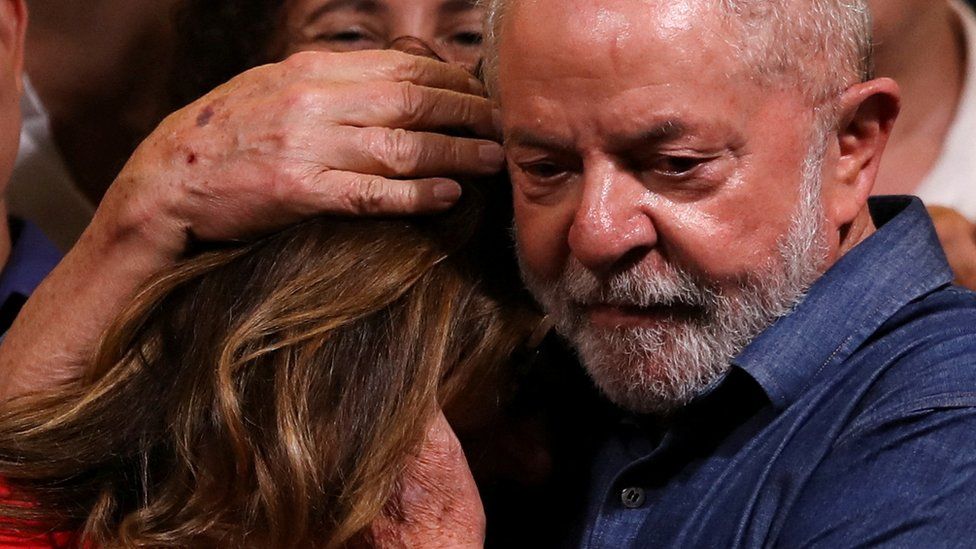
- 77 years old
- Left-wing
- Former metal worker
- President from 2003-2010
- Imprisoned in 2018 but conviction was later thrown out

Five key facts about Bolsonaro
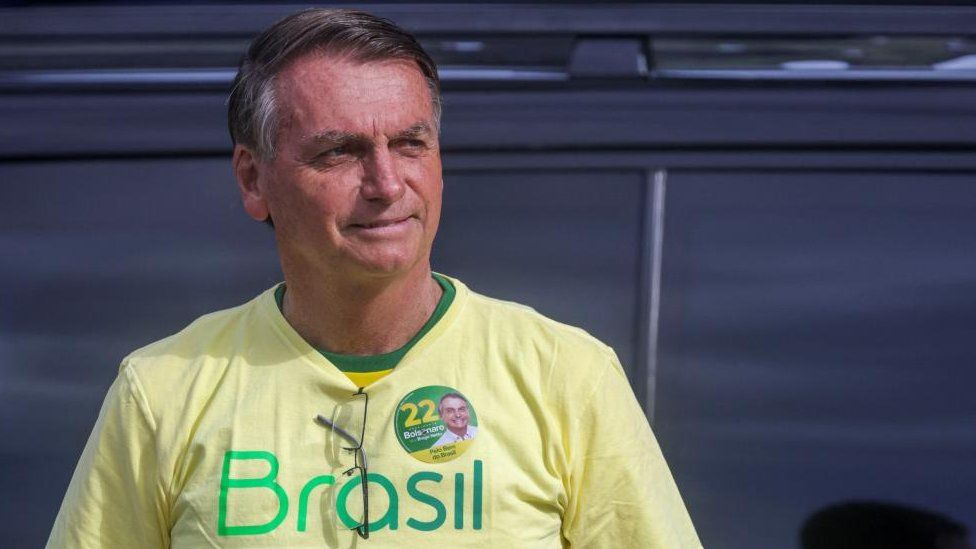
- 67 years old
- Far-right
- Former army captain
- Running for a second consecutive term
- Has cast unsubstantiated doubts on the trustworthiness of Brazil’s electronic voting system

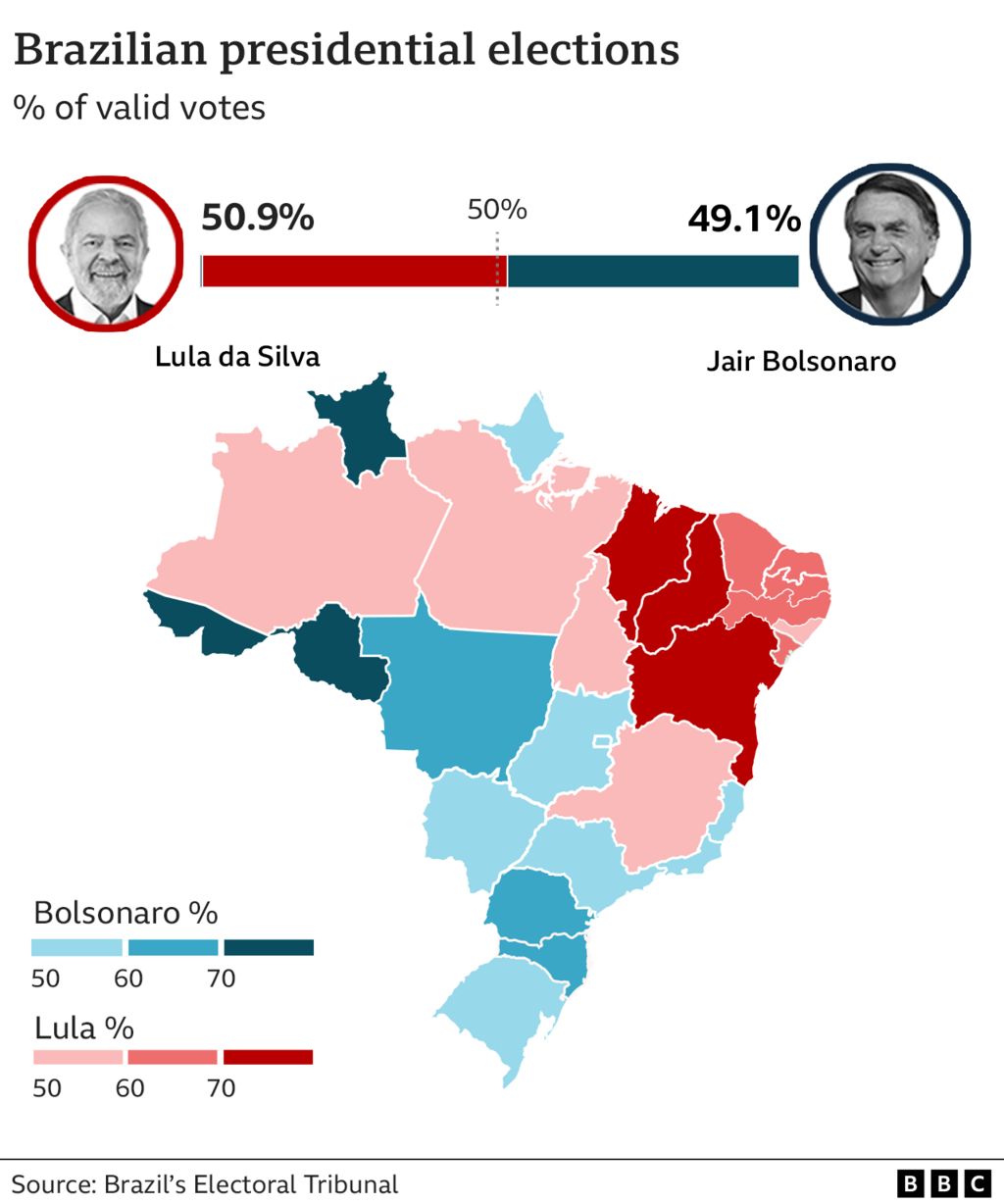
- “Brooks and Capehart on Trump forcing allies to reevaluate ties with U.S.”, PBS NewsHour
- Issue of the Week: Human Rights, Economic Opportunity, War, Hunger, Disease
- “Iran signals fast trials and executions for protesters as death toll in crackdown goes over 2,500”, Associated Press
- “Joe Rogan breaks with Trump over ‘Gestapo’ ICE operations”, The Hill
- “The Notorius M.T.G.”, The New Yorker
- January 2026
- December 2025
- November 2025
- October 2025
- September 2025
- August 2025
- July 2025
- June 2025
- May 2025
- April 2025
- March 2025
- February 2025
- January 2025
- December 2024
- November 2024
- October 2024
- September 2024
- August 2024
- July 2024
- June 2024
- May 2024
- April 2024
- March 2024
- February 2024
- January 2024
- December 2023
- November 2023
- October 2023
- September 2023
- August 2023
- July 2023
- June 2023
- May 2023
- April 2023
- March 2023
- February 2023
- January 2023
- December 2022
- November 2022
- October 2022
- September 2022
- August 2022
- July 2022
- June 2022
- May 2022
- April 2022
- March 2022
- February 2022
- January 2022
- December 2021
- November 2021
- October 2021
- September 2021
- August 2021
- July 2021
- June 2021
- May 2021
- April 2021
- March 2021
- February 2021
- January 2021
- December 2020
- November 2020
- October 2020
- September 2020
- August 2020
- July 2020
- June 2020
- May 2020
- April 2020
- March 2020
- February 2020
- January 2020
- December 2019
- November 2019
- October 2019
- September 2019
- August 2019
- July 2019
- June 2019
- May 2019
- April 2019
- March 2019
- February 2019
- January 2019
- December 2018
- November 2018
- October 2018
- September 2018
- August 2018
- July 2018
- June 2018
- May 2018
- April 2018
- March 2018
- February 2018
- January 2018
- December 2017
- November 2017
- October 2017
- September 2017
- August 2017
- July 2017
- June 2017
- May 2017
- April 2017






